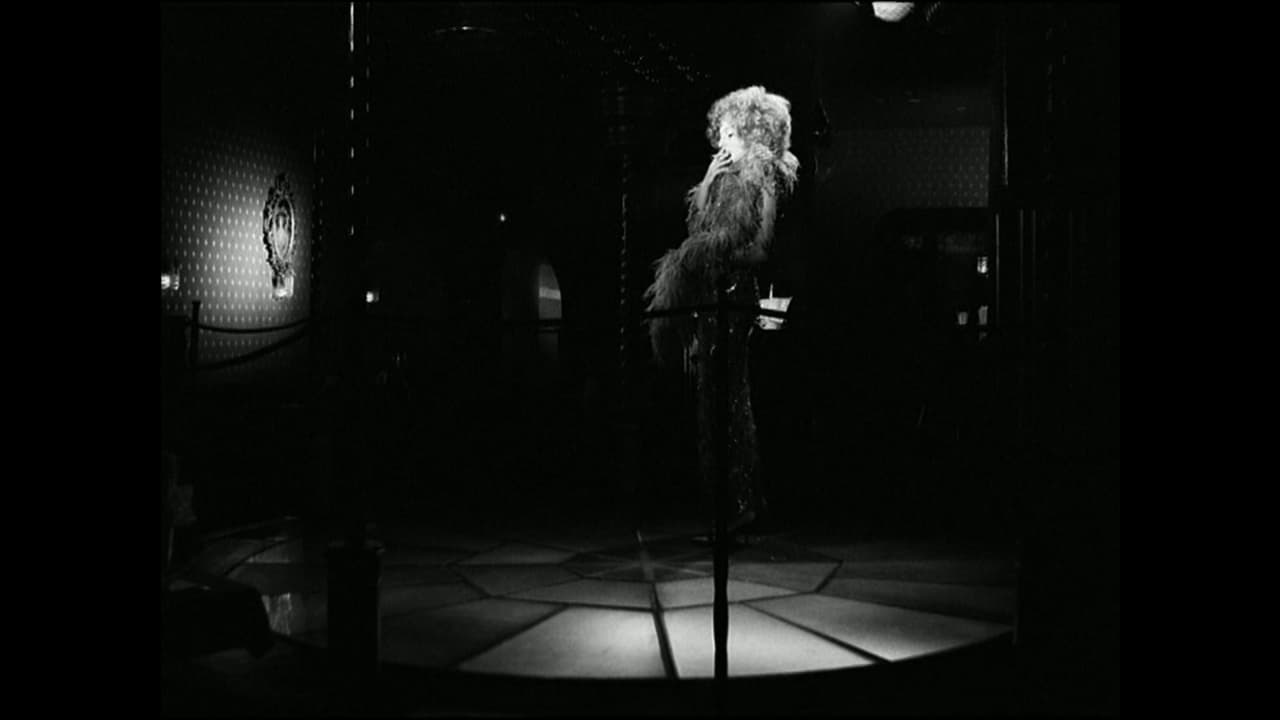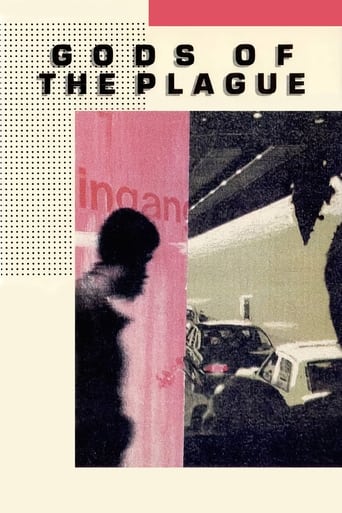

Götter Der Pest, directed by Rainer Werner Fassbinder is set in Munich, Germany. The main character Franz Walsch is a former prisoner played by Harry Baer. The setting is really dark and it reminds of film-noir but the plot is really realistic and I have to say anti-heroic. Franz doesn't have dreams, he seems that he doesn't want anything from his live. He is like a bored nihilist, a stoic human very different from the other characters of the film. The film centers on this character and his life. Franz had the chance to create a new life, he has every woman he wants, friends and his mother is still alone. But this affection seems to be drowned in hypocrisy of the modern society. Franz understands this and he chooses to continue a life of crime. Hanna Schygulla who plays Johanna is like the femme fatale of the story and she leads Franz to his death even if she loves him. Margarethe seems more loyal to Franz even if she is still lingered to society and her job. The male friends of Franz such as Gorilla are the only ones who can understand him. We have to point that Gorilla dies with him. Götter Der Pest is a punch to our society. Even if it is full of defects. The movie is very dark and at sometimes boring, the dialogs seem rather stodgy and arid. I think that Fassbinder shows his class here, because without a writing a great scenario he managed to do a nice movie which is worth of seeing even if it's not one of his bests. I recommend this movie to all of you who like artistic cinema and film-noir.
... View More"Gods of the Pest" (1970) with its hermetic title seems to be a clue-movie in the work of director Rainer Werner Fassbinder. Roughly speaking, it tells the story of Franz Walsh who has just been released from the Munich prison in Stammheim. We are not told for how long he was imprisoned, but the camera stands for considerable time on the signboard on which the name of the prison is written. Thus, we do not see either, if the Franz from "Gods of the Pest" is dizzy as is the Franz from Fassbinder's "Berlin Alexanderplatz" (1982), when they get back to liberty. But both Franz' take the tramway, as Piel Jutzi's Franz (and as Herzog's "Stroszek") does, our Franz '(as Piel Jutz's Franz and Stroszek) enters a restaurant, from where the story develops (in Fassbinder's Alexanderplatz Franz is picked up by the Jew Nachum, and it follows the famous Zannowich-story). Franz Walsch - a Fassbinder amalgamate from the Berlin Alexanderplatz-Franz Biberkopf and the American film director Raoul Walsh - now bears much more common features than only sharing his first name with the Alexanderplatz-Franz. However, when asked for his passport in the hotels, Franz Walsch tells the receptionist that his name is Franz Biberkopf. Both Franz'are former prison-inmates for whom there is no future now in the outside world. They have no other chance than to following up their former life that they had left before having been arrested. However, in the beginning, both Franz Walsch and Franz Biberkopf promise that they well stay honest. In the case of Franz Walsch, he stands between his old and the new girlfriend. The old one loves him too much and gets dangerous, the new one raises a credit, and both are astonished how quickly the money is used up. While Franz Biberkopf in the Alexanderplatz gets back to be a pimp, Franz Walsch and his former colleagues plan a coup ... . Despite being slightly different, one can say that "Gods of the plague" can be seen as Fassbinder's first finger-exercise towards filming Döblin's novel (which he would do only 9 years after the present movie). Meanwhile, Fassbinder himself appears as Franz Biberkopf in "The American Soldier", he hides himself behind the cutter of his movies "Franz Walsch", and there is hardly any Fassbinder film where there is no Franz or no Biberkopf: variations of the same topic: Franz Biberkopf from Alexanderplatz has to exercise himself in many characters, in many places and in many societies and times before he will find himself, almost at the end end of Fassbinder's life, in his ultimate form.
... View MoreIf only Bayer or Pfizer could bottle this movie for insomniacs, they'd make an even bigger fortune than they do now. Fassbinder proved he could fashion unique cinematic art out of a bunch of people standing around excoriating each other in several of his early pictures, but here the internal tensions never mount and the tropes don't connect. Some claim it to be a homage to film noir, and certainly there is alienation, paranoia and betrayal in spades, as well as iconic visual references to classics like Laura and Double Indemnity. But the moody lighting and framing in his excellent "The American Soldier" are much closer to the noir stylings of Alton and Planer than the arid non-style here. However, the greatest offense of the film is the inclusion of a seemingly endless, static sequence featuring the playing of a phonograph record of a gimmicky children's tune about an oddball menagerie -- I guarantee you that this nauseating little ditty will echo in your skull for days. At the same time, the subtitlers are owed a great deal of credit for their incisively clever translation of the absurd rhyming couplets into (very British) English.
... View MoreAfter being released from prison, young Franz has to find his place in society, and police keeps an eye on him. First he briefly tries to live with his former girl friend who still loves him a bit too passionately, however he also picks up other acquaintances. Society is hostile to him, or at least perceived by him as being so, hence it is tough to make money. But he definitely wants to keep a cool lifestyle so he must keep on law-breaking, in particular when he is with his old betraying friends.
... View More